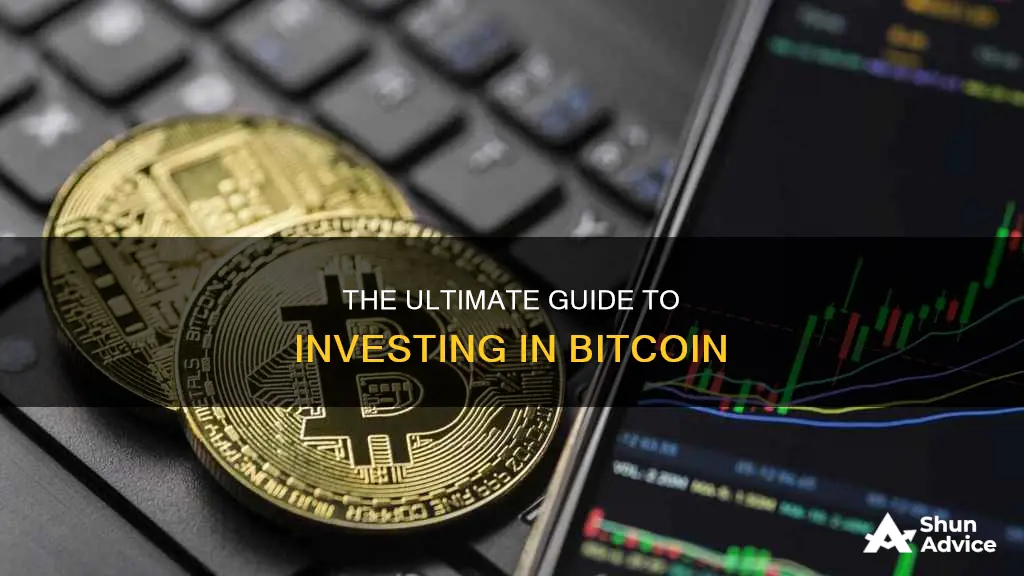
Bitcoin is one of the most widely used types of cryptocurrency. It was created to solve a couple of big cryptocurrency flaws, including the fraudulent duplication of coins. It uses a digital technology called blockchain, an advanced coding mechanism that disperses a single code over thousands of different computers.
If you're interested in buying Bitcoin, you'll first need to open an exchange or platform that allows Bitcoin trading. There are thousands of financial products and services out there, but some of the most popular options include Coinbase, Kraken, Gemini, and Binance.
It's important to remember that investing in cryptocurrency is risky, so it's important not to invest more money than you can afford to lose.
| Characteristics | Values |
|---|---|
| How to invest | Buy and store one or more cryptocurrencies, invest in companies with a partial or total focus on cryptocurrency, invest in a cryptocurrency-focused fund, invest in a cryptocurrency Roth IRA, or become a crypto miner or validator |
| Where to invest | Crypto exchanges (e.g. Coinbase, Binance, Kraken, Gemini, Bitfinex), apps (e.g. Cash App, Venmo), broker-dealers |
| Risks | High-risk investment, prone to pump-and-dump schemes, subject to regulatory changes, no central regulator, no consumer protections, no access to Financial Ombudsman Service or Financial Services Compensation Scheme |
| Tips | Understand your risk tolerance, diversify your portfolio, start small |
| Strategies | Buy and hold, hold long term, trade on short-term volatility |
What You'll Learn

Where to buy Bitcoin
There are several ways to buy Bitcoin, each with its own advantages and disadvantages. Here is a list of some of the most popular methods:
Cryptocurrency Exchanges
Cryptocurrency exchanges are platforms that allow users to buy and sell various cryptocurrencies, including Bitcoin. Examples of popular exchanges include Coinbase, Gemini, Kraken, Crypto.com, and Binance. These exchanges offer a variety of features, such as advanced trading tools, real-time order books, charting capabilities, and more. However, it is important to carefully research the fees and consumer protections offered by each exchange before choosing one.
Traditional Stockbrokers
A few traditional investment brokers, such as Robinhood Crypto, Webull, TradeStation, and Fidelity, offer their customers the ability to buy and sell Bitcoin. These brokers may provide a more familiar interface for those who are accustomed to investing in traditional financial products. For example, Robinhood charges no fees for Bitcoin trades, similar to its stock-trading platform.
Peer-to-Peer Money Transfer Apps
Cash transfer services like PayPal, Venmo, Cash App, and River allow users to purchase, store, send, and sell Bitcoin directly through their apps. This option may be convenient for those who are already familiar with these interfaces. However, it is important to note that using cash in these apps may result in higher fees compared to regular exchanges.
Bitcoin ATMs
Bitcoin ATMs are physical machines that function like normal ATMs, allowing users to buy and sell Bitcoin. They can often be found in locations where traditional ATMs are placed, such as convenience stores. It is important to research the fees associated with these ATMs before conducting a transaction.
Bitcoin Exchange-Traded Funds (ETFs)
Bitcoin ETFs are investment funds that track the price of Bitcoin and trade on major exchanges. The approval of spot Bitcoin ETFs by the Securities and Exchange Commission has made it easier for traditional investors to gain access to Bitcoin. These ETFs can be traded through traditional brokerage accounts.
When deciding where to buy Bitcoin, it is important to consider factors such as fees, security, ease of use, and the specific features offered by each platform. Additionally, it is crucial to have a plan for storing your Bitcoin securely, such as using a hot wallet or a cold wallet.
Why Ripple Could Be a Better Investment Than Bitcoin
You may want to see also

How to store Bitcoin
Storing Bitcoin safely is essential to prevent loss of funds. Here is a comprehensive guide on how to store Bitcoin securely:
Understanding Wallets and Storage Options:
- Custodial vs. Non-Custodial Wallets: In a custodial wallet, a third party, such as an exchange, manages your private keys. Non-custodial wallets, on the other hand, give you full ownership and control of your private keys.
- Hot vs. Cold Wallets: Hot wallets are connected to the internet, making your funds easily accessible. Examples include desktop, mobile, and web-based wallets. Cold wallets, or offline wallets, are not connected to the internet, providing higher security. Examples include hardware and paper wallets.
Types of Bitcoin Wallets:
- Desktop Wallet: A program installed on your computer. Not the safest option as it is susceptible to hacking.
- Mobile Wallet: A program hosted on your smartphone, often self-custodial. While convenient for transactions, it is less secure than cold wallets and not ideal for storing large amounts.
- Hardware Wallet: A physical device similar to a USB drive that stores your private keys offline. It is considered one of the safest options for long-term Bitcoin storage. Examples include Ledger Nano X and Trezor Model T.
- Web-based Wallet: A wallet hosted by a web service where a third party stores your keys for you. This option is not recommended due to security risks.
- Paper Wallet: A simple and affordable cold storage option. It involves printing out your public and private keys, usually in the form of QR codes. However, it has a high risk of user error and is less user-friendly.
Best Practices for Storing Bitcoin:
- Use a combination of hot and cold wallets to balance security and accessibility.
- Store the majority of your Bitcoin in a cold wallet, such as a hardware wallet, for enhanced security.
- Use a hot wallet for smaller amounts that you need for frequent transactions.
- Always back up your Bitcoin wallet regularly to prevent loss due to computer failure.
- Keep your software and operating systems up to date to patch security vulnerabilities.
- Enable two-factor authentication and use strong passwords to protect your wallet.
- Physically record and securely store your recovery phrases or seed phrases, which can help you recover your crypto if you lose access to your wallet.
- Never share your private keys or recovery phrases with anyone.
Bitcoin Investment: Is This the Week to Buy?
You may want to see also

How to invest in Bitcoin
Bitcoin is a form of digital money that you can buy, sell, or use to make online transactions. It is one of the most widely used types of cryptocurrency, with a market capitalisation of around £857 billion.
If you're interested in investing in Bitcoin, here is a step-by-step guide:
- Join a Bitcoin Exchange: You'll need to determine where you want to make a Bitcoin purchase. Most Bitcoin investors use cryptocurrency exchanges such as Coinbase, Binance, Kraken, Gemini, or Bitfinex. These exchanges act as the middlemen of cryptocurrency investing, like a stock brokerage.
- Get a Bitcoin Wallet: When you purchase Bitcoin, it's stored in a "wallet", which is where all your cryptocurrency is stored. There are two types of wallets: a "hot wallet" or a "cold wallet". A hot wallet is one that's operated by either your cryptocurrency exchange or by a provider. A cold wallet is an actual piece of hardware that stores your coins, usually a portable device similar to a flash drive.
- Connect Your Wallet to a Bank Account: You'll need to link your wallet to your bank account to enable you to purchase and sell coins. Alternatively, your bank account may be linked to your cryptocurrency exchange account.
- Place Your Bitcoin Order: Decide how much Bitcoin you want to purchase. Some coins cost thousands of dollars, but exchanges often allow you to buy fractions of a single coin. Remember that investing in Bitcoin is very risky, so carefully determine your risk tolerance and review your investment strategy before purchasing.
- Manage Your Bitcoin Investments: Once you've purchased Bitcoin, you can use your coins to make online transactions, hold them for the long term in the hopes that their value will increase, or perform day trading by buying and selling coins with other Bitcoin owners, which can be facilitated on the cryptocurrency exchange.
It's important to note that investing in Bitcoin is very risky due to its volatile nature. The value of Bitcoin can rise or fall dramatically in a very short period, even within a few hours or days. There is also no central regulator or physical asset backing up the value of Bitcoin, and it is subject to regulatory changes. Therefore, it's crucial to carefully consider your risk tolerance, investment strategy, and financial goals before investing in Bitcoin.
Why You Should Consider Investing in Bitcoin UK
You may want to see also

Risks of investing in Bitcoin
Investing in Bitcoin and other cryptocurrencies is becoming increasingly popular, but it's important to be aware of the risks involved. Here are some of the key risks associated with investing in Bitcoin:
Volatile and Fluctuating Market
The price of Bitcoin is highly volatile and can fluctuate significantly in a short period. This makes it difficult to predict whether you will get a return on your investment. To minimise the risk of massive losses, it's recommended to make small investments and keep a close eye on the market.
Cyberattacks and Fraud
As a technology-based investment, Bitcoin is susceptible to cyberattacks and hacking. There is also a risk of fraud in the Bitcoin market, with fake exchanges duping unsuspecting investors out of their money. Additionally, if you lose access to your Bitcoin wallet, there is often no way to retrieve your coins.
Limited Acceptance as a Currency
Despite its popularity, Bitcoin is not widely accepted as a legitimate currency. Only a few companies, such as Overstock, Newegg, and Monoprix, accept Bitcoin as a form of payment. This limited acceptance could impact the future value and usability of Bitcoin.
Regulatory Uncertainty
The Bitcoin market currently operates with little to no major regulations, as it is a relatively new concept for governments and financial institutions. The lack of taxation and regulatory oversight could lead to problems in the future, especially if Bitcoin is seen as competition for government-issued currencies.
Technology Reliance and System Shutdown
Bitcoin is entirely reliant on technology, and any issues with the underlying systems could impact its value and usability. Additionally, as a 100% technology-based currency, Bitcoin owners are more vulnerable to cyber threats and online fraud.
Tax Implications
Profits from buying and selling Bitcoin are subject to capital gains tax laws in many countries, including the US and the UK. It's important for investors to understand the tax implications in their jurisdiction to avoid legal and financial penalties.
Ponzi Scheme Concerns
Some critics argue that Bitcoin is a Ponzi scheme, where people at the top benefit from the ignorance of those joining later. As more people invest, a bubble economy is created, which could eventually burst, leaving many people with worthless cryptocurrency and significant financial losses.
In conclusion, while investing in Bitcoin can offer potential opportunities, it's important to approach it with caution and a long-term mindset. Investors should be aware of the risks involved and take steps to secure their funds and brace for potential market shifts.
Smart Strategies to Invest 10K in Bitcoin
You may want to see also

Benefits of investing in Bitcoin
Bitcoin is a peer-to-peer network and digital currency that was first introduced in 2009. It is decentralized and independent of any government or banking authorities. Here are some of the benefits of investing in Bitcoin:
Lower fees
Bitcoin allows users to make financial transactions at lower fees than traditional online payment mechanisms. This makes it an enticing opportunity for those who believe Bitcoin has a bright future.
Lower inflation risk
All world currencies are controlled by their respective governments, which can lead to fluctuations in value as governments keep printing more money. In contrast, Bitcoin undergoes predictable inflation at a halved rate every four years, and the blockchain system is infinite, so there is little need to worry about the currency losing its value.
Lower falling risk
Bitcoin investors believe that Bitcoin has a lower falling risk compared to other currencies because it is a global currency that does not depend on government policy, which can cause hyperinflation or the collapse of a currency.
Simple, easy, and cheap transactions
Bitcoin transactions are simple, easy, and cheap. Since buyers cannot claim their money back after purchase, it gives sellers the opportunity to ship the product or service to the buyer without any worry of recovery.
Portability
With major world currencies, it is difficult and risky to carry large amounts of cash. With Bitcoin, you can easily carry around a million dollars' worth of Bitcoin on a memory card.
Untraceable
Once the seller receives the money, it cannot be traced back to the buyer. This means that no government can trace the source of the funds.
Growing demand
As more people use Bitcoin as their primary currency, the price of Bitcoin will increase. This makes it a good long-term investment.
Tai Lopez's Guide to Bitcoin Investing
You may want to see also
Frequently asked questions
Some popular crypto exchanges to invest in Bitcoin include Coinbase, Binance, Kraken, Gemini, and Bitfinex.
Some things to consider when choosing a crypto exchange include the number of tokens and coins available, the price or commission charged, the ease of use, the security of the platform, and the features offered.
A crypto wallet is designed for the safe storage of your cryptocurrency, while a crypto exchange allows you to buy and sell cryptocurrency easily and quickly. With a wallet, you hold your private keys securely, whereas with an exchange, you provide the exchange with your private keys, and they act as your custodian.
You can get started with investing in Bitcoin with as little as $5 or £10.
Investing in Bitcoin carries high risks due to its volatile nature. The value of Bitcoin can fluctuate dramatically over a short period, and there is a potential for significant losses if the market crashes. Additionally, there is a lack of consumer protection in the cryptocurrency space, and your investments may not be insured or protected in the event of exchange failure or security breaches.







